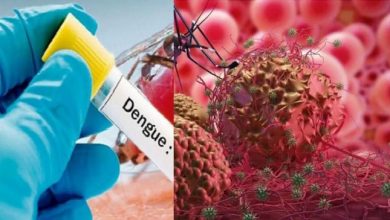What Is Dengue Fever: A Serious Illness Report

What Is Dengue Fever- Dengue fever, also known as break bone fever, is an illness caused by Dengue virus that is similar to the flu. It is caused when a healthy person is bitten by an Aedes mosquito carrying the virus. This disease is mostly found in the world’s tropical and subtropical regions. Each year, an estimated 500,000 people require hospitalization, according to WHO.
Every year, millions of people become infected with dengue. Southeast Asia, the western Pacific islands, Latin America, Mexico and Africa are the most affected by dengue fever.
However, the disease has spread to new areas, including local outbreaks in Europe and the parts of Central and South America.
Severe dengue was first identified during dengue epidemics in the Philippines and Thailand in the 1950s. Severe dengue fever now affects the majority of Asian and Latin American countries, and it is a leading cause of hospitalisation and death among children and adults in these regions.
Read Also:
- Molluscum Contagiosum: Symptoms Of Molluscum Contagiosum
- Signs of Non alcoholic Fatty Liver Disease: A Complete Report
What Is Dengue Fever And What Is Severe Dengue?
Dengue fever is a painful and incapacitating mosquito-borne disease caused by one of four closely related to this viruses.
One in every four people infected with dengue becomes acutely unwell.Symptoms of dengue fever can range from mild to severe.The term “severe dengue” refers to a severe form of dengue.
Severe dengue fever can be fatal within a few hours and frequently necessitates medical intervention and hospitalization.
What Causes Dengue Fever And How It Spreads?
Dengue fever is caused by the Dengue virus.Dengue fever is spread by the bite of a dengue virus-infected Aedes mosquito.
It has four types: DENV-1, DENV-2, DENV-3, and DENV-4. When a mosquito bites an already infected person (who has dengue virus in their blood), the virus enters the mosquito and the mosquito becomes infected. And the illness is spread when a healthy person is bitten by it, and the virus spreads through the person’s bloodstream.
It cannot be transmitted directly from one person to another.
When a person recovers, he becomes immune to the specific virus but not to the other three variants. If one is infected for the second, third, or fourth time, chances of developing severe Dengue fever, also known as Dengue Hemorrhagic Fever, increase.
What Are The Types Of Dengue Fever?
A person is susceptible to three types of fever: mild dengue fever, dengue hemorrhagic fever, and dengue shock syndrome.
- Mild Dengue Fever – Symptoms appear one week after the bite and can lead to severe or fatal complications.
- Dengue Hemorrhagic Fever – The symptoms are mild at first, but they can worsen over time.
- Dengue Shock Syndrome – A severe form of dengue that can result in death.
Severe cases of dengue fever can progress into a condition known as dengue haemorrhagic fever. When the blood vessels become damaged and leaky, infected person may develop severe dengue.
In addition, the number of clot-forming cells (platelets) in the blood decreases.
Dengue hemorrhagic fever patients exhibit the same symptoms as dengue fever patients but when the fever subsides, the patient may experience more serious symptoms such as persistent vomiting, severe abdominal pain, and difficulty in breathing.
Hemorrhagic fever is a rare complication characterized by high fever, lymph and blood vessel damage, bleeding from the nose and gums, liver enlargement, and circulatory system failure.
Dengue hemorrhagic fever, if left untreated, can cause nosebleeds, bleeding gums, and internal bleeding.
The symptoms may progress to massive bleeding, shock, and death.
This is known as Dengue Shock Syndrome (DSS).This is a serious condition that necessitates immediate medical attention.
Symptoms Of Dengue Fever
Dengue causes a wide range of diseases. It can vary from subclinical disease (where people are unaware, they are exposed to the virus) to severe flu-like symptoms in those who are infected.
Though it’s less common, some people can develop severe dengue, which might result in a variety of complications such as severe bleeding, organ impairment, and/or plasma leakage. Severe dengue has a greater risk of mortality if not treated properly.
Symptoms, which typically appear four to six days after infection and can last up to ten days, may include:
- Sudden, high fever
- Severe headaches
- Pain behind the eyes
- Severe joint, bone and muscle pain
- Fatigue
- Nausea
- Vomiting
- Skin rash, which appears two to five days after the onset of fever
- Mild bleeding (such a nose bleed, bleeding gums, or easy bruising)
- Swollen glands
Severe dengue fever, which is a life-threatening emergency, can manifest quickly. The warning signs usually appear within the first day or two after fever has subsided, and may include:
- Severe stomach pain
- Persistent vomiting
- Bleeding from gums or nose
- Blood in urine, stools or vomit
- Bleeding beneath the skin, which may appear as bruising
- Difficult or rapid breathing
- Fatigue
- Irritability
- Restlessness
Treatment
There is no specific treatment for dengue fever, but conservative measures should be taken to avoid complications.
Treatment For Mild Cases Of Dengue
- Consult a doctor if there is any fever or other dengue symptom.
- Rest as much as possible.
- Take acetaminophen (also known as paracetamol outside of the United States) to control fever and relieve pain.
- Stay hydrated by drinking plenty of fluids. Drink water or electrolyte-fortified beverages.
- For mild symptoms, care for a sick infant, child, or family member at home.
- Do not take aspirin or ibuprofen
NSAIDs (non-steroidal anti-inflammatory drugs), such as ibuprofen and aspirin should be avoided. These anti-inflammatory medicines act by thinning the blood, and in a disease with risk of haemorrhage, blood thinners may actually worsen the prognosis.
Treatment For Severe Form Of Dengue
- If there are any alarming signs, see a healthcare provider or go to the emergency room immediately.
- Severe Dengue fever is a medical emergency. It necessitates immediate medical attention at a clinic or hospital.
- In cases of severe dehydration, IV drips are sometimes used as a supplement.
Summary
Dengue fever is a viral infection which spreads by mosquitos, found in tropical and subtropical climates worldwide, primarily in urban and semi-urban areas.
While many DENV infections cause only mild illness, some cause severe flu-like symptoms. This can occasionally progress to a potentially fatal form known as severe dengue. It necessitates the supervision of medical professionals.
Dengue/severe dengue has no specific treatment. Early detection of disease progression associated with severe dengue, as well as access to proper medical care, reduces severe dengue fatality rates to less than 1%.
Dengue fever’s global prevalence has risen dramatically in recent decades. Approximately half of the world’s population is now in danger.
Effective vector control measures are essential for dengue prevention and control. Long-term community involvement can significantly improve vector control efforts.



